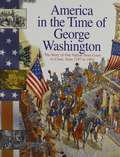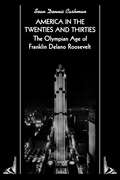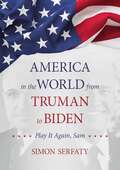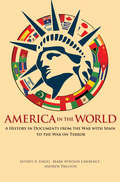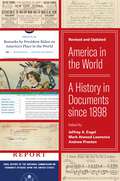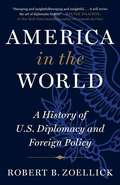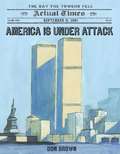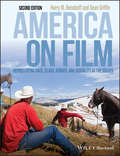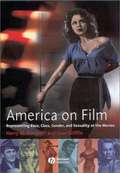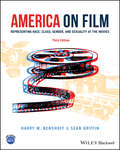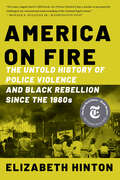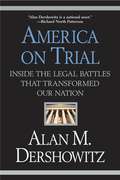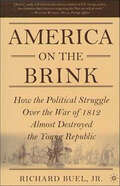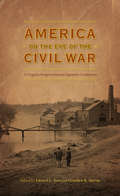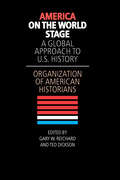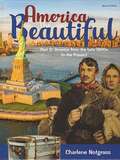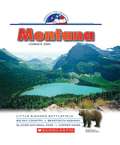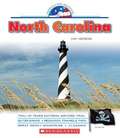- Table View
- List View
America in the Time of Franklin Delano Roosevelt, 1929-1948
by Sally Senzell Isaacs<P>America in the Time of... helps readers explore our nation's past by focusing on key figures in history. Each visually stunning spread features clearly written text that explains the social, political, and economic realities of the time. The series visits all areas of the United States from coast to coast, and offers information about the native as well as invading and immigrant peoples. Each book features: <br>-- beautiful reconstruction artwork, <br>-- authentic primary source photographs, <br>-- detailed maps, both modern and historical, <br>-- profiles of famous people who shaped that time, <br>-- a list of noteworthy places, and <br>-- a bibliography of fiction books to extend learning.
America in the Time of George Washington, 1747 to 1803
by Sally Senzell IsaacsBuilding a new nation is far from easy. Meet Americans such as George Washington, Thomas Jefferson, and Benjamin Franklin. Also learn about the groups, such as Native Americans, African Americans, and others.
America in the Time of Martin Luther King Jr. (1948-1976)
by Sally Senzell IsaacsAmerica in the Time of is a series of nine books arranged chronologically, meaning that events are described in the order in which they happened. In each book, most articles deal with a particular event or part of American history. This book is about America from 1948 to 1976.
America in the Time of Susan B. Anthony
by Sally Senzell IsaacsUses the life of Susan B. Anthony as a reference to examine the development of the United States from 1845 to 1928.
America in the Twenties and Thirties: The Olympian Age of Franklin Delano Roosevelt
by Sean Dennis CashmanIn this, the third volume of an interdisciplinary history of the United States since the Civil War, Sean Dennis Cashman provides a comprehensive review of politics and economics from the tawdry affluence of the 1920s throught the searing tragedy of the Great Depression to the achievements of the New Deal in providing millions with relief, job opportunities, and hope before America was poised for its ascent to globalism on the eve of World War II. The book concludes with an account of the sliding path to war as Europe and Asia became prey to the ambitions of Hitler and military opportunists in Japan. The book also surveys the creative achievements of America's lost generation of artists, writers, and intellectuals; continuing innovations in transportation and communications wrought by automobiles and airplanes, radio and motion pictures; the experiences of black Americans, labor, and America's different classes and ethnic groups; and the tragicomedy of national prohibition. The cast of characters includes FDR, the New Dealers, Eleanor Roosevelt, George W. Norris, William E. Borah, Huey Long, Henry Ford, Clarence Darrow, Ernest Hemingway, Scott Fitzgerald, W.E.B. DuBois, A. Philip Randolph, Orson Welles, Wendell Willkie, and the stars of radio and the silver screen. The first book in this series, America in the Gilded Age, is now accounted a classic for historiographical synthesis and stylisic polish. America in the Age of the Titans, covering the Progressive Era and World War I, and America in the Twenties and Thirties reveal the author's unerring grasp of various primary and secondary sources and his emphasis upon structures, individuals, and anecdotes about them. The book is lavishly illustrated with various prints, photographs, and reproductions from the Library of Congress, the Museum of Modern Art, and the Whitney Museum of American Art.
America in the Twenties: A History
by Geoffrey PerretEveryone knows the Twenties: flappers, jazz bands, the Charleston, teacups filled with bathtub gin-one long party and everyone had a hangover (known as the Depression) in the morning. The Twenties are both the most derided decade in American history and the most glamorous. It has been a pleasant experience to be told "How interesting" when people wanted to know what I was writing. They often elaborated with remarks such as "What a wonderfully decadent time!" or "That was the last time Americans really knew how to enjoy themselves." Almost without exception the hundred or more people who've asked me about this book had a firm, unshakable idea of what the period was like. I had begun with much the same idea myself. I thought of the Twenties as a period that had been "done"-to a turn.
America in the World from Truman to Biden: Play it Again, Sam
by Simon SerfatyDoes America still count in the world? Can the world still count on America? In raising such questions halfway into a series of systemic shocks that began in September 2001, Simon Serfaty, a long-time scholar of international politics, reminds Americans that their country’s well-being and that of the world are intertwined. Play it again, Sam: History is in a foul mood again, and this is no time to come home and leave behind an unfinished European Union facing the ghosts of a revanchist Russia still claiming the Old World as its own; a strategic dark hole in the Greater Middle East, on the eve of a global Sarajevo moment; and China’s surging hegemonic power in a continent fraught with too much history and too little geography. Admittedly, what is good for America may no longer be best for all the West, and what is good for the West may no longer be good for much of the Rest: the unipolar moment is irreversibly over. Yet, writing in an elegant style and with much historical insight, Serfaty argues that even with the old power map irreversibly gone, mainly to the benefit of the non-Western world, a new world order for the twenty-first century will remain dependent on the U.S. role, its capabilities and its efficacy, as well as its leadership and its purpose.
America in the World: A History in Documents from the War with Spain to the War on Terror (America in the World #14)
by Jeffrey A. Engel, Mark Atwood Lawrence and Andrew PrestonA one-of-a-kind anthology of primary texts in American foreign relationsHow should America wield its enormous power beyond its borders? Should it adhere to grand principles or act on narrow self-interest? Should it partner with other nations or avoid entangling alliances? Americans have been grappling with questions like these throughout the nation's history, and especially since the emergence of the United States as a major world power in the late nineteenth century. America in the World illuminates this history by capturing the diverse voices and viewpoints of some of the most colorful and eloquent people who participated in these momentous debates.Spanning the era from the Gilded Age to the Obama years, this unique reader collects more than two hundred documents—everything from presidential addresses and diplomatic cables to political cartoons and song lyrics. It encompasses various phases of American diplomatic history that are typically treated separately, such as the First World War, the Cold War, and 9/11. The book presents the perspectives of elite policymakers—presidents, secretaries of state, generals, and diplomats—alongside those of other kinds of Americans, such as newspaper columnists, clergymen, songwriters, poets, and novelists. It also features numerous documents from other countries, illustrating how foreigners viewed America&’s role in the world.Ideal for classroom use, America in the World sheds light on the complex interplay of political, economic, ideological, and cultural factors underlying the exercise of American power on the global stage.Includes more than two hundred documents from the late nineteenth century to todayLooks at everything from presidential addresses to political cartoons and song lyricsPresents diverse perspectives, from elite policymakers to clergymen and novelistsFeatures documents from outside the United States, illustrating how people in other countries viewed America&’s role in the world
America in the World: A History in Documents since 1898, Revised and Updated
by Jeffrey A. Engel, Mark Atwood Lawrence, and Andrew PrestonA wide-ranging anthology of primary texts in American foreign relations—now expanded to include documents from the Trump years to todayHow should America wield its power beyond its borders? Should it follow grand principles or act on narrow self-interest? Should it work in concert with other nations or avoid entangling alliances? America in the World captures the voices and viewpoints of some of the most provocative, eloquent, and influential people who participated in these and other momentous debates. Now fully revised and updated, this anthology brings together primary texts spanning a century and a half of U.S. foreign relations, illuminating how Americans have been arguing about the nation&’s role in the world since its emergence as a world power in the late nineteenth century.Features more than 250 primary-source documents, reflecting an extraordinary range of viewsIncludes two new chapters on the Trump years and the return of great power rivalries under BidenSweeps broadly from the Gilded Age to emerging global challenges such as COVID-19Shares the perspectives of presidents, secretaries of state, and generals as well as those of poets, songwriters, clergy, newspaper columnists, and novelistsAlso includes non-American perspectives on U.S. power
America in the World: A History of U.S. Diplomacy and Foreign Policy
by Robert B. ZoellickAmerica has a long history of diplomacy–ranging from Benjamin Franklin, Alexander Hamilton, and Thomas Jefferson to Henry Kissinger, Ronald Reagan, and James Baker–now is your chance to see the impact these Americans have had on the world. Recounting the actors and events of U.S. foreign policy, Zoellick identifies five traditions that have emerged from America's encounters with the world: the importance of North America; the special roles trading, transnational, and technological relations play in defining ties with others; changing attitudes toward alliances and ways of ordering connections among states; the need for public support, especially through Congress; and the belief that American policy should serve a larger purpose. These traditions frame a closing review of post-Cold War presidencies, which Zoellick foresees serving as guideposts for the future.Both a sweeping work of history and an insightful guide to U.S. diplomacy past and present, America in the World serves as an informative companion and practical adviser to readers seeking to understand the strategic and immediate challenges of U.S. foreign policy during an era of transformation.
America is Under Attack: The Day the Towers Fell - September 11, 2001
by Don Brown<P><P>On the ten year anniversary of the September 11 tragedy, a straightforward and sensitive book for a generation of readers too young to remember that terrible day. <P><P> The events of September 11, 2001 changed the world forever. In the fourth installment of the Actual Times series, Don Brown narrates the events of the day in a way that is both accessible and understandable for young readers. <P><P>Straightforward and honest, this account moves chronologically through the morning, from the terrorist's plane hijackings to the crashes at the World Trade Center, the Pentagon, and Pennsylvania; from the rescue operations at the WTC site in New York City to the collapse of the buildings.
America on Film
by Harry M. Benshoff Sean GriffinAmerica on Film: Representing Race, Class, Gender, and Sexuality in the Movies, 2nd Edition is a lively introduction to issues of diversity as represented within the American cinema. Provides a comprehensive overview of the industrial, socio-cultural, and aesthetic factors that contribute to cinematic representations of race, class, gender, and sexuality Includes over 100 illustrations, glossary of key terms, questions for discussion, and lists for further reading/viewing Includes new case studies of a number of films, including Crash, Brokeback Mountain, and Quinceañera
America on Film: Representing Race, Class, Gender, and Sexuality at the Movies
by Harry M. Benshoff Sean GriffinAmerica on Film: Representing Race, Class, Gender, and Sexuality in the Movies is a lively introduction to issues of diversity as represented within the American cinema. Introduces issues of diversity as represented within the American cinema in a lively and accessible manner. Provides a comprehensive overview of the industrial, socio-cultural, and aesthetic factors that contribute to cinematic representations of race, class, gender, and sexuality. Is designed specifically for students and includes 101 illustrations, a glossary of key terms, questions for discussion, and lists for futher reading and further viewing. Includes case studies of a number of films, including The Lion King, The Jazz Singer, Smoke Signals, The Grapes of Wrath, and The Celluloid Closet. Each chapter features a concise overview of the topic at hand, a discussion of representative films, figures, and movements, and an in-depth analysis of a single film.
America on Film: Representing Race, Class, Gender, and Sexuality at the Movies
by Harry M. Benshoff Sean GriffinA comprehensive and insightful examination of the representation of diverse viewpoints and perspectives in American cinema throughout the 20th and 21st centuries America on Film: Representing Race, Class, Gender and Sexuality at the Movies, now in its third edition, is an authoritative and lively examination of diversity issues within American cinema. Celebrated authors and academics Harry M. Benshoff and Sean Griffin provide readers with a comprehensive discussion and overview of the industrial, socio-cultural, and aesthetic factors that contribute to cinematic representations of race, class, gender, sexuality, and ability. The book incorporates several different theoretical perspectives, including film genre, auteurism, cultural studies, Orientalism, the "male gaze," feminism, and queer theory. The authors examine each selected subject via representative films, figures, and movements. Each chapter also includes an in-depth analysis of a single film to illuminate and inform its discussion of the chosen topic. America on Film fearlessly approaches and tackles several controversial areas of representation in film, including the portrayal of both masculinity and femininity in film and African- and Asian-Americans in film. It devotes the entirety of Part V to an analysis of the depiction of sex and sexuality in American film, with a particular emphasis on the portrayal of homosexuality. Topics covered include: The structure and history of American filmmaking, including a discussion of the evolution of the business of Hollywood cinema African Americans and American film, with a discussion of BlacKkKlansman informing its examination of broader issues Asian, Latin/x, and Native Americans on film Classical Hollywood cinema and class, with an in-depth examination of The Florida Project Women in classical Hollywood filmmaking, including a discussion of the 1955 film, All that Heaven Allows Perfect for undergraduate and graduate students in film, media, and diversity-related courses, the book also belongs on the shelves of anyone interested in diversity issues in the context of American studies, communications, history, or gender studies. Lastly, it's ideal for use within corporate diversity training curricula and human relations training within the entertainment industry.
America on Fire: The Untold History Of Police Violence And Black Rebellion Since The 1960s
by Elizabeth HintonFrom one of our top historians, a groundbreaking story of policing and “riots” that shatters our understanding of the post–civil rights era. <P><P> What began in spring 2020 as local protests in response to the killing of George Floyd by Minneapolis police quickly exploded into a massive nationwide movement. Millions of mostly young people defiantly flooded into the nation’s streets, demanding an end to police brutality and to the broader, systemic repression of Black people and other people of color. To many observers, the protests appeared to be without precedent in their scale and persistence. Yet, as the acclaimed historian Elizabeth Hinton demonstrates in America on Fire, the events of 2020 had clear precursors—and any attempt to understand our current crisis requires a reckoning with the recent past. <P><P>Even in the aftermath of Donald Trump, many Americans consider the decades since the civil rights movement in the mid-1960s as a story of progress toward greater inclusiveness and equality. Hinton’s sweeping narrative uncovers an altogether different history, taking us on a troubling journey from Detroit in 1967 and Miami in 1980 to Los Angeles in 1992 and beyond to chart the persistence of structural racism and one of its primary consequences, the so-called urban riot. Hinton offers a critical corrective: the word riot was nothing less than a racist trope applied to events that can only be properly understood as rebellions—explosions of collective resistance to an unequal and violent order. As she suggests, if rebellion and the conditions that precipitated it never disappeared, the optimistic story of a post–Jim Crow United States no longer holds. <P><P>Black rebellion, America on Fire powerfully illustrates, was born in response to poverty and exclusion, but most immediately in reaction to police violence. In 1968, President Lyndon Johnson launched the “War on Crime,” sending militarized police forces into impoverished Black neighborhoods. Facing increasing surveillance and brutality, residents threw rocks and Molotov cocktails at officers, plundered local businesses, and vandalized exploitative institutions. Hinton draws on exclusive sources to uncover a previously hidden geography of violence in smaller American cities, from York, Pennsylvania, to Cairo, Illinois, to Stockton, California. <P><P>The central lesson from these eruptions—that police violence invariably leads to community violence—continues to escape policymakers, who respond by further criminalizing entire groups instead of addressing underlying socioeconomic causes. The results are the hugely expanded policing and prison regimes that shape the lives of so many Americans today. Presenting a new framework for understanding our nation’s enduring strife, America on Fire is also a warning: rebellions will surely continue unless police are no longer called on to manage the consequences of dismal conditions beyond their control, and until an oppressive system is finally remade on the principles of justice and equality.
America on Trial: Inside the Legal Battles That Transformed Our Nation
by Alan M. DershowitzOne might wonder how the trial of Mike Tyson or Lizzie Borden "transformed our nation" as opposed to other cases included by Dershowitz (law, Harvard U.), such as the Brown vs. Board of Education or Bush vs. Gore, but the reasoning behind the selection becomes clearer when he notes that the "basic criterion is passion" (i.e. a reflection of the passion of the times, arousing the passion of Americans, etc.). Basing his narratives of 64 American trials on the actual transcripts from the courtroom, he describes such cases as the trials of John Peter Zenger, Aaron Burr, Sacco and Vanzetti, Leopold and Loeb, the Rosenbergs, American Indian Movement activists, Bernhard Goetz, and John DeLorean. Annotation ©2004 Book News, Inc., Portland, OR (booknews.com)
America on the Brink: How the Political Struggle Over the War of 1812 Almost Destroyed the Young Republic
by Richard Buel Jr.The fascinating story of how New England Federalists threatened to dissolve the Union by making a separate peace with England during the War of 1812. Many people would be surprised to learn that the struggle between Thomas Jefferson's Republican Party and Alexander Hamilton's Federalist Party defined--and jeopardized--the political life of the early American republic. Richard Buel Jr.'s America on the Brink looks at why the Federalists, who worked so hard to consolidate the federal government before 1800, went to great lengths to subvert it after Jefferson's election. In addition to taking the side of the British in the diplomatic dance before the war, the Federalists did everything they could to impede the prosecution of the war, even threatening the Madison Administration with a separate peace for New England in 1814. Readers fascinated by the world of the Founding Fathers will come away from this riveting account with a new appreciation for how close the new nation came to falling apart almost fifty years before the Civil War.
America on the Eve of the Civil War
by Edward L. Ayers Carolyn R. Martin"This remarkable publication provides a captivating and brilliantly executed series of conversations among seventeen most impressive historians. These participants in a daylong conference focusing on the extraordinary years leading to the Civil War provide an incredible range of historical information that is both educational and exciting. Here is an opportunity to draw on a lively exchange between a substantial number of knowledgeable and entertaining scholars."--James Oliver Horton, author of Landmarks of African American History
America on the World Stage: A Global Approach to U.S. History
by Organization of American HistoriansRecognizing the urgent need for students to understand the emergence of the United States' power and prestige in relation to world events, Gary W. Reichard and Ted Dickson reframe the teaching of American history in a global context. Each essay covers a specific chronological period and approaches fundamental topics and events in United States history from an international perspective, emphasizing how the development of the United States has always depended on its transactions with other nations for commodities, cultural values, and populations. For each historical period, the authors also provide practical guidance on bringing this international approach to the classroom, with suggested lesson plans and activities. Ranging from the colonial period to the civil rights era and everywhere in between, this collection will help prepare Americans for success in an era of global competition and collaboration. Contributors are David Armitage, Stephen Aron, Edward L. Ayers, Thomas Bender, Stuart M. Blumin, J. D. Bowers, Orville Vernon Burton, Lawrence Charap, Jonathan Chu, Kathleen Dalton, Betty A. Dessants, Ted Dickson, Kevin Gaines, Fred Jordan, Melvyn P. Leffler, Louisa Bond Moffitt, Philip D. Morgan, Mark A. Noll, Gary W. Reichard, Daniel T. Rodgers, Leila J. Rupp, Brenda Santos, Gloria Sesso, Carole Shammas, Suzanne M. Sinke, Omar Valerio-Jimenez, Penny M. Von Eschen, Patrick Wolfe, and Pingchao Zhu.
America the Beautiful Part 1: America from 1000 to 1877
by Charlene NotgrassAmerica the Beautiful, collated in a chronological order, is a package where we learn about America in thirty units. Lessons include: Our American Story; God's Wonders; An American Landmark; An American Biography; Daily Life. The author of the book ensures that readers learn about God in the making of America.
America the Beautiful Part 1: America from 1000 to 1877
by Charlene NotgrassAmerica the Beautiful by Charlene Notgrass is a one-year American history, geography, and literature course designed for students in grades 5-8. It combines the flexibility and richness of a unit study with the simplicity of a textbook-based approach to history. Daily lessons guide your child chronologically through American history, highlighting key events, people, and places. This book has 75 lessons beginning with life in America before Europeans came and continuing through the first years after the Civil War.
America the Beautiful Part 2: America from 1800s to the Present
by Charlene NotgrassThis book is a continuation of America the Beautiful Part 1 in telling the American Story.
America the Beautiful Part 2: America from the Late 1800s to the Present
by Charlene NotgrassThis book has 75 lessons beginning with the late 1800s and continuing to modern times.
America the Beautiful: Montana
by R. Conrad SteinMontana is one of the nations largest states, but it is home to very few large towns or cities. Rather, it is defined by its vast wilderness areas, which range from the high peaks of the Rocky Mountains to the rolling hills and flatlands of the Great Plains. Readers will find out how Montana was settled and what role it has played in U.S. history. They will also explore the states rich culture and traditions.
America the Beautiful: North Carolina
by Ann HeinrichsNorth Carolina Is A Place Of Varied Landscapes. Its mountains are among the tallest and most rugged east of the Mississippi River, and its coastal plains are low and flat. High in the western mountains rises Mount Mitchell. At 6,684 feet (2,037 meters), it's the state's highest point. Hundreds of miles to the east, the land drops down to sea level along the Atlantic coast.

